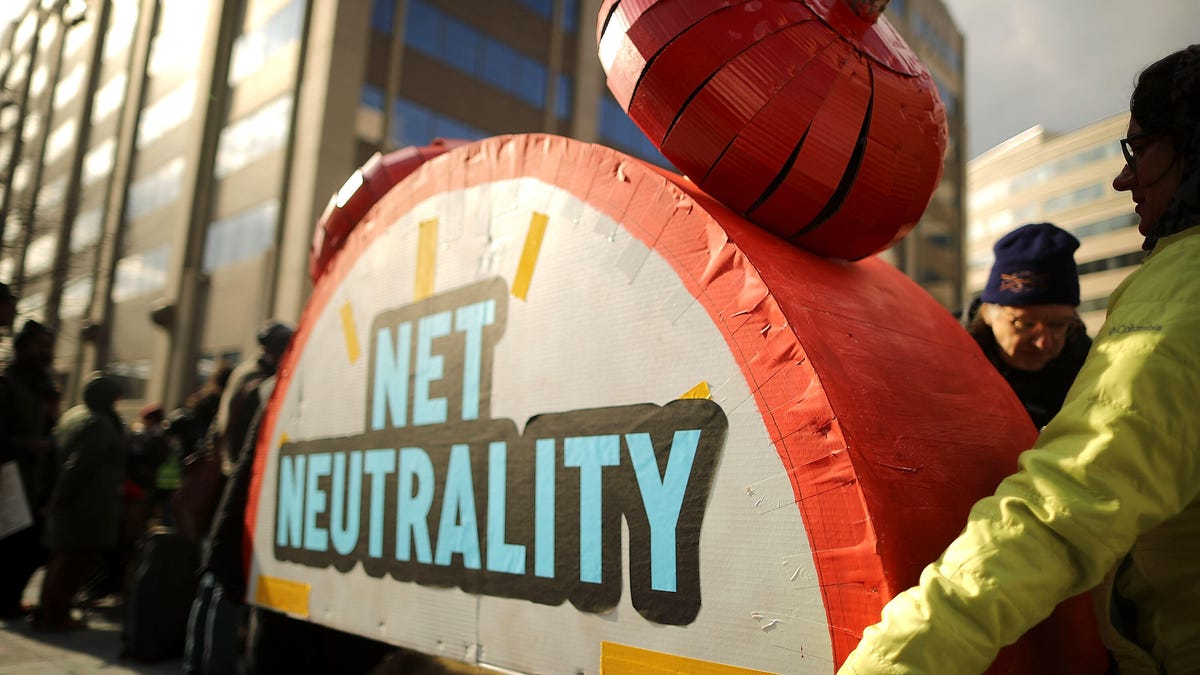To save net neutrality, Mozilla and others file appeal
The company wants the full DC Circuit Court of Appeals to rehear the case upholding the FCC's repeal of Obama-era rules.

Mozilla and others are hoping time's not up for net neutrality.
The fight to reinstate net neutrality protections continued Friday, as Mozilla and others asked the full DC Circuit Court of Appeals to rehear their case challenging the Federal Communications Commission's 2017 repeal of the rules. Mozilla and Public Knowledge, one of the public interest groups that intervened in the lawsuit, say they're seeking the rehearing to ensure safeguards for consumers and the open internet.
The DC Circuit Court of Appeals issued its net neutrality decision in October, after a three-judge panel heard the case. Mozilla and others suing to restore the Obama-era rules had a Friday deadline to ask the court to hear the case again in front of its full slate of justices. The court will decide whether the rehearing will go forward.
"As we said then, the fight is far from over," said Amy Keating, chief legal officer for Mozilla. "The decision raises issues of exceptional importance to protecting consumers and the open internet, and we look forward to continuing the fight to preserve net neutrality as a fundamental digital right."
In its October decision, the appeals court found the FCC hadn't overstepped its authority in 2017 when it voted to deregulate broadband companies like Comcast and Verizon. It was an important win for Republicans at the agency. Consumer groups, tech companies and local government officials had sued to restore rules passed in 2015 under a Democratic administration.
But there was a wrinkle in the decision: The court also found that the FCC had overstepped its authority when it banned states from enacting their own open internet rules. This decision has essentially paved the way for states to pass their own net neutrality laws and regulations.
Mozilla and public interest groups viewed the decision as a partial victory but felt the court erred on the main point.
"Although the court came to the right conclusion on some key issues, such as the FCC's lack of authority to preempt state net neutrality rules, in other ways it gave the FCC the benefit of the doubt too many times," said John Bermayer, legal director for Public Knowledge. "While agencies should be given deference where appropriate, they do not have the authority to rewrite the law or come to illogical, results-driven conclusions."
The big issue in the case centered around whether the FCC had the right to change the classification of broadband. How the agency classifies broadband determines whether it has the authority to police the internet to ensure that broadband companies aren't abusing their power as gatekeepers.
The 2015 rules adopted under FCC Chairman Tom Wheeler, a Democrat, classified broadband as a Title II service, which allowed the FCC to write rules preventing broadband providers from blocking or slowing access to the internet, or charging for faster access. The rules also firmly established the FCC's authority as the "cop on the beat" when it comes to stopping potential broadband abuses.
That all changed when FCC Chairman Ajit Pai, a Republican, took charge of the agency in 2017. He changed the classification of broadband to a Title I service and threw out the old rules, essentially stripping the FCC of its authority.
In the DC Circuit Court of Appeals' decision, the justices argued that even though it made sense to classify broadband as a Title II service, which gave the FCC authority to regulate it, the court still had to follow Supreme Court precedent, which holds that expert agencies such as the FCC can determine how they apply federal statutes.
If the court accepts the appeal, it'll be reheard before a full panel of justices on the DC Circuit Court of Appeals, rather than the smaller subset of three judges that heard the case earlier this year.
This latest legal move will likely keep the issue alive through the presidential election in 2020. Nearly all of the 2020 Democrats running for president have said they support net neutrality, including Sens. Bernie Sanders of Vermont, Elizabeth Warren of Massachusetts, Amy Klobuchar of Minnesota, and Mayor Pete Buttigieg of South Bend, Indiana. These candidates have promised to appoint FCC commissioners who would reinstate the old rules.
Democrats in Congress are also pushing for a fix. The House of Representatives, controlled by Democrats, passed net neutrality legislation in April. But Senate Majority Leader Mitch McConnell, a Republican from Kentucky, has refused to bring the bill to the floor for a vote in the Senate. Sens. Edward Markey, a Democrat from Massachusetts, who authored the Senate's Save the Internet Act, Maria Cantwell from Washington, and Ron Wyden from Oregon took to the Senate floor earlier this week demanding an immediate vote.

